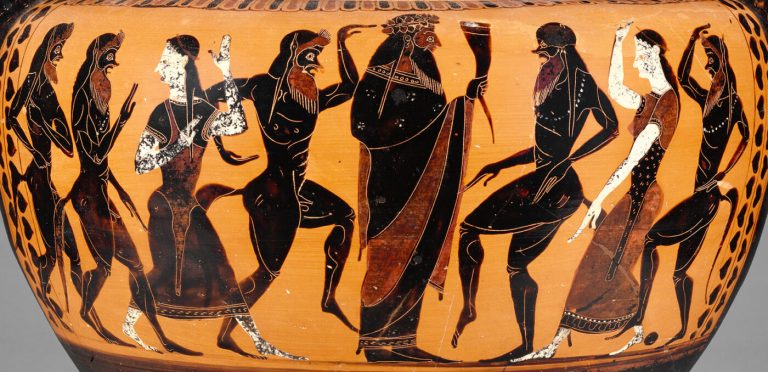Translation of Hölderlin Brod und Wein 1. and 2.

Black Figure column krater c.520BC of the 3-day (Feb. 19~21) Anthesteria Dionysus and Wine Festival.
Note1: For a full discussion of the important Anthesteria Festival, I recommend Natalie Sofie Utheim, The Ancient Greek Festival of Anthesteria A Study of Invisible Participantsin Classical Athens (University of Oslo, 2019). Here is a link to it: https://www.duo.uio.no/bitstream/handle/10852/73109/Utheim-Master.pdf?sequence=1&isAllowed=y
Note2. Here is the structure of the German accentual elegiac couplet, which is considerably different than the quantitative one in Greek and Latin:
Hexameter where every dactyl can be replaced with a trochee / x .
/ x x / x x / x x / x x / x x / x
Pentameter: In the first half before the pause (||), each of the two dactyls can be replaced with trochees. After the pause, the meter pretty is strict.
/ x x / x x / x || / x x / x x /
While I call || a pause, it is in fact the interruption of synapheia by period end. While it can be an actual pause both in Classical languages and German, I recommend you consider it a break in metrical units.
Note3: I do not intend to provide a full aesthetic interpretation of Brod und Wein Parts 1. ~ 9. It is an extremely difficult poetic series to simplify with a complexity in metaphors, imagery, similes and syntax that exceeds anything in European poetry with the possible exception of Leopardi’s La Ginestra. Out of that combination comes an unearthly, boundless, transforming beauty that invests the poem’s thematic structure. I would, however, like to stress the difficult German syntax. All complete English translations of the poem simplify the syntax and avoid the meter to provide easier reading. The one slight exception is Michael Hamburger in Friedrich Hölderlin Poems and Fragments (London, 2008 in revised edition). In his versions of the odes, elegies and hymns he distorts the German text almost completely to meet the meter yet give that easier reading other translators accept as necessary. If you would like to see just how complex the Brod und Wein syntax can be, here is the last sentence of Part 2 in German to consider:
Aber sie muß uns auch, daß in der zaudernden Weile,
Daß im Finstern für uns einiges Haltbare sei,
Uns die Vergessenheit und das Heiligtrunkene gönnen,
Gönnen das strömende Wort, das, wie die Liebenden, sei,
Schlummerlos und vollern Pokal und kühneres Leben,
Heilig Gedächtnis auch, wachend zu bleiben bei Nacht.
To Heinze 1. All around rests the city; quiet grow the illuminate alleys, And, with torches adorned, rumble the coaches away. Cheered they go home with their daily pleasures to rest the people, Gain and loss now weighs over a pondering head, Well contented at home; empty it stands of grapes and flowers, And of its handmade work rests the marketplace stall. But stringed music resounds far away from gardens; perhaps, that There is a lover who plays songs or a solitary man Thinking of distant friends and his youthful days; and the fountains, Always welling and fresh, rush by the fragrant flower beds. Soft in the somber air resound with their tolling the church bells, And of the hours so aware calls out a watchman the time. Now too rises a breeze and ruffles across the crest of the woodland, Look! and the shadowy globe only an image, the moon Comes again so stealthily now; the enraptured, the night comes Full of stars that are just slightly concerned about us, Shines the astonishing there, the stranger to all of the people Over the mountain tops mournful and splendid above. 2. Wonderful is the kindness of the highly exalted and no one Knows from where or what thrust she has given to us. So she impels the world and the hoping soul of the people, Even no wise man knows, what she prepares, for so Wills it the highest god, who very much loves you, and therefor Is still dearer, than she, yours is the reasoning day. But at times the clear-cut eye also has love of the shadows And attempts to enjoy, prior to needing it, sleep, Or a faithful man also will happily gaze into the night, Yes, it is right for her wreaths to devote and a song, Since to the wandering lost and the dead she is hallowed, Yet herself all endures, always, in spirit most free. But to us also she must, that in the wavering moment, That in darkness for us something durable is, Grant to us heedless oblivion and holy drunkenness, Grant the onrushing word, the, as the lovers, may be, Sleepless and fuller goblet and far more greathearted life, Holy remembrance too, waking to stay in the night.
